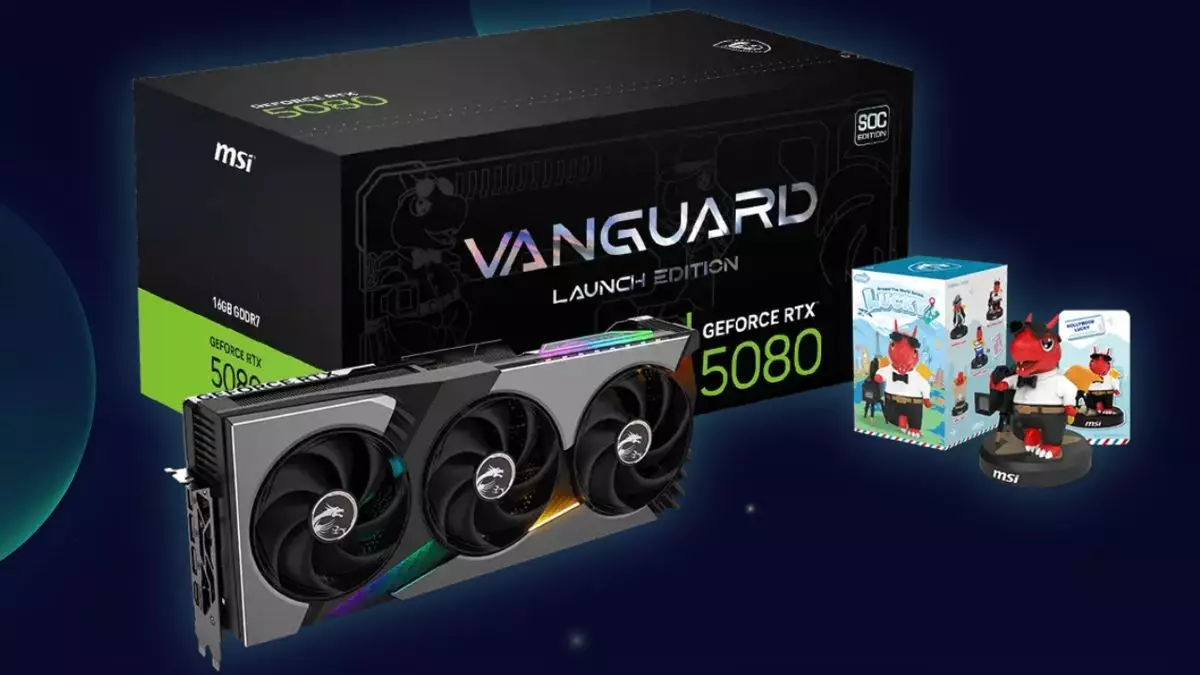In an era dominated by rapid technological advancements, the intersection of gaming and nostalgia has been producing intriguing phenomena that often border on the absurd. The recent case of MSI’s promotional campaign surrounding its Lucky Dragon figurines and the RTX 5080 graphics card illustrates this unique blend. It’s a concept that longing consumers find irresistible, a mixture of childhood whimsy and adult financial investment. With Taiwan Original Price House offering a chance to exchange nine of these figurines for a top-tier GPU, one must wonder: are consumers really craving high-performance hardware, or has the allure of collectibles gone too far?
Gaming is undeniably a passion, and for many, it is a lifestyle choice that transcends mere entertainment. The clamor for the RTX 5080 can be attributed not just to gamers but to enthusiasts eager to showcase their technological prowess. However, the figurine promotion raises a cautionary flag about whether these promotions are veering into the realm of gimmickry. Are gamers actually buying into their passion, or are they merely grasping at straws in a market eager to capitalize on their fervent dreams?
The Cost of ‘Collectible’ Culture
While the excitement of acquiring a rare collectible is palpable, the path leading to it can be riddled with financial pitfalls. The commercialization of collectibles has transformed toys and figures into high-stakes items, often leading to significant crop-ups on the market. The promotion’s fine print reveals a catch: to obtain the figurines, consumers must first purchase a launch edition of MSI’s graphics card. This situation creates a closed loop of consumption where each figurine essentially equals a partial payment towards owning an RTX 5080, with many unaware of the actual implications of this monetary commitment.
In theory, gaming collectibles should offer enjoyment or investment opportunities; however, they often turn into burdens, leading to a secondary market that fluctuates wildly in value. Reports of individuals offering NT$4,000 for a specific dragon model reflect both the rarity and the obsession surrounding these items. Still, with the RTX 5080 retailing at a whopping $999, this single piece-in-hand value reveals the uneven scales balancing nostalgia against practical economics. Are we truly seeing a market of valuable goods, or are we witnessing inflated value based on hype?
The Emotional Dimension of Hardware and Collectibles
Amidst the stark realities of market forces and consumerism lies a more profound emotional impetus—nostalgia. Just as the writer recalls their father’s futile investment in NatWest pigs, many gamers have personal stories fueled by memorabilia, whether they were given as gifts or earned through laborious effort. These stories and the collectibles serve as bookmarks in the chapters of their lives. The excitement of an RTX 5080 is tangible, yes, but the existence of Lucky Dragon figurines becomes a connection to the vibrant life experiences that games have fostered.
How many of us have memories tied to virtual achievements, cherished games, or even gaming conventions? When the writer reflects on a long-lost MSI figurine, it’s not merely a lament about missed moneymaking opportunities; it represents a lost relic of camaraderie, competition, and sweat over pixelated scores. This emotional resonance may easily surpass the material value of the figurine or even the coveted GPU, making one question the true purpose behind consumer behavior.
The Future of Gaming Promotions: A Double-Edged Sword
As the landscape of gaming matures, promotions like MSI’s may become standard fare. However, the seriousness and cost of owning high-end hardware make one ponder the sustainability of these marketing strategies. Are companies creating robust relationships with their community, or merely dabbling in promotional tactics that serve the bottom line?
The real test for consumers lies in their willingness to engage meaningfully with these promotions while retaining their sense of self and identity. In the quest for collector status, one must ask: does this promotion enhance the gaming experience, or does it serve to distract from the inherent value of gaming itself? The allure of Limited Edition items is hard to deny, yet their subtle transformation of passion into profit presents an ever-thorny question regarding the future of the gaming culture we choose to embrace.

